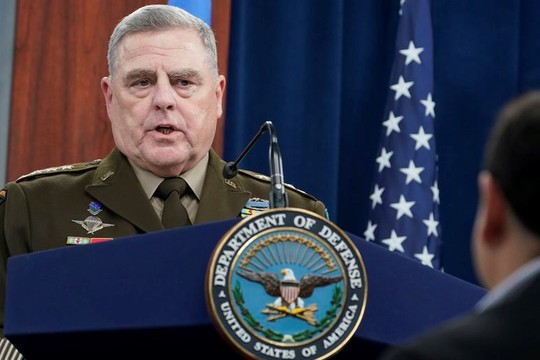Joint Chiefs Chairman Gen. Mark A. Milley speaks during a briefing at the Pentagon in Washington.
Photo: AP
America’s top general said he’s not surprised that Ukraine’s much-anticipated spring counteroffensive against Russia hasn’t progressed as rapidly as some analysts and commentators might have predicted.
In a speech to the National Press Club, Army Gen. Mark A. Milley, chairman of the Joint Chiefs of Staff, said war on paper and the “real” war experienced by soldiers on the ground are entirely different.
Gen. Milley, who is stepping down soon, said he is receiving regular updates on the campaign through a variety of sources, including intelligence reports and frequent discussions with his Ukrainian counterpart, Gen. Valery Zaluzhny. The Ukrainian commander has publicly expressed his frustration over public criticism that his troops are moving slower than anticipated against dug-in Russian fortifications in occupied eastern and southern Ukraine.
“I said this [counteroffensive] is going to take six, eight or ten weeks. It’s going to be very difficult, it’s going to be very long, and it’s going to be very, very bloody,” he said. “No one should have any illusions about any of that.”
Gen. Milley said the U.S. and its NATO allies are providing Ukraine with as much firepower “as is humanly possible.”
Western allies receive increasingly ‘sobering’ updates on Ukraine’s counteroffensive: ‘This is the most difficult time of the war’, notes CNN.
Weeks into Ukraine’s highly anticipated counteroffensive, Western officials describe increasingly “sobering” assessments about Ukrainian forces’ ability to retake significant territory, four senior US and western officials briefed on the latest intelligence told CNN.
“They’re still going to see, for the next couple of weeks, if there is a chance of making some progress. But for them to really make progress that would change the balance of this conflict, I think, it’s extremely, highly unlikely,” a senior western diplomat told CNN.
The primary challenge for Ukrainian forces is the continued difficulty of breaking through Russia’s multi-layered defensive lines in the eastern and southern parts of the country, which are marked by tens of thousands of mines and vast networks of trenches. Ukrainian forces have incurred staggering losses there, leading Ukrainian commanders to hold back some units to regroup and reduce casualties.
“Russians have a number of defensive lines and they [Ukrainian forces] haven’t really gone through the first line,” said a senior Western diplomat. “Even if they would keep on fighting for the next several weeks, if they haven’t been able to make more breakthroughs throughout these last seven, eight weeks, what is the likelihood that they will suddenly, with more depleted forces, make them? Because the conditions are so hard.”
Multiple officials said the approach of fall, when weather and fighting conditions are expected to worsen, gives Ukrainian forces a limited window to push forward.
In addition, Western officials say the slow progress has exposed the difficulty of transforming Ukrainian forces into combined mechanized fighting units, sometimes with as few as eight weeks of training on western-supplied tanks and other new weapons systems. The lack of progress on the ground is one reason Ukrainian forces have been striking more often inside Russian territory “to try and show Russian vulnerability,” said a senior US military official.
These latest assessments represent a marked change from the optimism at the start of the counteroffensive. These officials say those expectations were “unrealistic” and are now contributing to pressure on Ukraine from some in the West to begin peace negotiations, including considering the possibility of territorial concessions.
Some officials fear the widening gap between expectations and results will spark a “blame game” among Ukrainian officials and their western supporters, which may create divisions within the alliance which has remained largely intact nearly two years into the war.
“The problem, of course, here is the prospect of the blame game that the Ukrainians would then blame it on us,” said a senior western diplomat.
read more in our Telegram-channel https://t.me/The_International_Affairs

 9:56 11.08.2023 •
9:56 11.08.2023 •























